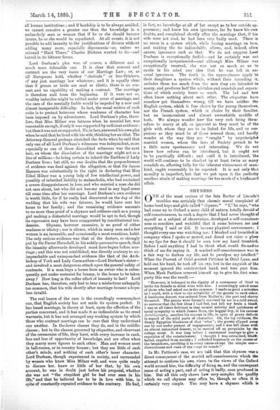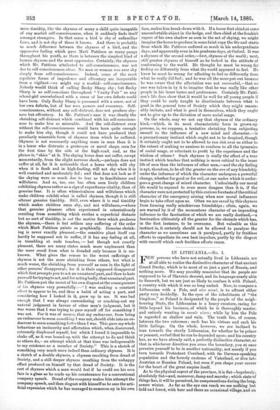SHYNESS.
ONE of the most serious of the late Rector of Lincorn'e troubles was certainly that chronic moral complaint of home-bred boys and girls called " shyness.' " I," he says, "who
had come up to Oxford a mere child of nature, totally devoid of self-consciousness, to such a degree that I had never thought of myself as a subject of observation, developed a self-consciouwness so sensitive and watchful that it came between me and everything I said or did. It became physical nervousness ; I thought every one was watching me; I blushed and trembledi in company when I spoke or moved, and dared not raise a glhas to my lips for fear it should be seen how my hand trembled. Before I said anything I had to think what would Sa-and-so think of me for saying it. A marked self-consciousness was in a fair way to darken my life, and to paralyse my intellect."
When the Provost of Oriel greeted Pattison in Oriel Lane, and held out his hand, he took off his cap, but in the anguish of the moment ignored the outstretched hand, and tore past him. When Mark Pattison screwed himself up to give his first wineparty this was the result :—
" However, it belonged to the dignity of a commoner of Oriel to invite his friends to drink wine with him. I accordingly asked 801110 of these who had asked me is the auramer. I made as good a aelectien as I could, with a view to the suitability of the guests to each other. A handsome dessert was ordered from Sadler's ; the port and sherry decanted. The guests were formally received by me in a cold sweat, so nervous that the few ideas I had fled, end left my brain o blaatt. I was at all times deficient in that mental activity mid quickness of social sympathy to which James Burn, the beggar-boy, in his curious Autobiography, ascribes his success in life, in spite of grave defect in regard of the solid parte of character. Oh, the icy coldness, the dreary Egyptian blankness of that ' wine' ; the guests slipped away one by one under pretext of engagements, and I was left alone with an almost untouched dessert, to be carried off as perquisite by the college scout. It was long before 1 summoned courage to give a repetition of the entertainment. I thought I was ostracised, bleatballed, expelled from society ; I reflected hopelessly on the caussopef the breakdown, ascribing it to every cause except the simple one— clownishness and want of the v sagedu monde."
In Mr. Pattison's case, we are told that this shyness wata direct consequence of the morbid self-consciousness which the attempt to conform his own views to the views of the Oxford
world around him, the difficulty of doing so, and the conseqnsat sense of acting a part, and of acting it badly, soon produced in him. But all this only shows how very complex the quality which we call shyness may often be, though as often it is certainly very simple. You may have a shyness whichis
mere timidity, like the shyness of many a child quite incapable of any morbid self-consciousness, when it suddenly finds itself amongst strangers. In that sense a bird is shy of unfamiliar frees, and is not shy of those it knows. And there is probably as much difference between the shyness of a bird, and the oppressive feeling which gave Mark Pattison so many pangs throughout his youth, as there is between the simplest kind of human shyness and the most oppressive. Certainly, the shyness which Mr. Pattison attributed to self-consciousness, was not due to self-consciousness alone. No man or woman was ever shy simply from self-consciousness. Indeed, some of the most repulsive forms of impudence and effrontery are inseparable from a vigilant—we might say a morbid—self-consciousness. Nobody would think of calling Becky Sharp shy ; but Becky Sharp is as self-conscious throughout " Vanity Fair " as any school-girl overwhelmed with a sense of her own defects could have been. Only Becky Sharp is possessed with a sense, not of her own defects, but of her own powers and resources. Selfconsciousness, without any self-distrust, does not produce shyness but effrontery. In Mr. Pattison's case it was clearly the shrinking self-distrust which combined with his self-consciousness to make him so miserable. And the self-distrust even without the self-consciousness would have been quite enough to make him shy, though it could not have produced that peculiarly miserable form of shyness from which he suffered. Shyness is not necessarily anything more in man than it is in a horse who distrusts a grotesque or novel shape, seen for the first time by the side of the high-road, and, as the phrase is, "shies " at it. The shying horse does not suffer, except momentarily, from the slight nervous shock,—perhaps does not suffer at all, for it is noticeable that a horse which will shy when it is fresh and in high-feeding, will not shy when it is well exercised and moderately fed ; and that does not look as if the shying were so much due to fear as to fancifulness and wilfulness. And so, too, one has often seen lively children exhibiting shyness rather as a sign of superfluous vitality, than of genuine fear. It is often whimsicalness and wilfulness which make children exhibit what is called shyness, though it is still oftener genuine timidity. Still, even where it is real timidity which makes children seem shy, and not wilfulness,—where that genuine pleasure often experienced in ostentatiously recoiling from something which excites a superficial distaste but no sort of timidity, is not the motive force which produces the shyness,—there is but seldom any suffering of the order which Mark Pattison paints so graphically. Genuine shrinking is never exactly pleasant, —the sensitive plant itself can hardly be supposed not to suffer, if it has any feeling at all, in trembling at rude touches, — but though not exactly pleasant, there are many states much more unpleasant than the mere recoil from what is dreaded only because it is unknown. What gives the venom to the worst sufferings of shyness is not the mere shrinking from others, but what is much worse, the shrinking from yourself as seen in the light of other persons' disapproval; for it is their supposed disapproval which first prompts you to act an unnatural part, and then to hate yourself for tryiag to act, and for acting badly, that unnatural part. Mr. Pattison put the secret of his own disgust at the consequences of his shyness very powerfully :—" I was making a constant effort to appear to be, and thus a habit of acting a part, and considering bow I looked in it, grew up in me. It was bad enough that I was always surrendering or crushing-out my natural judgment in favour of other men's judgment, but it was worse that I was trying to pass myself off for something I was not. For it was of course, that my endeavour, from being an endeavour to seem something I was not, should slide into an endeavour to seem something better than I was. This gave my whole behaviour an insincerity and affectation which, when discovered, extremely displeased myself, but which I found it impossible to shake off, as it was bound-up with the attempt to do and think as others do,— an attempt which at that time was indispensable to my existence as a member of Society." This is a sketch of something very much more indeed than ordinary shyness. It is a sketch of a double shyness, a shyness resulting from dread of Society, and a still deeper shyness resulting from the unhappy effect produced on himself by that dread of Society. It is the sort of shyness which a man would feel if he could see his own face in a glass as he made up his countenance for a conventional company speech. Dread of the company makes him attempt the company speech, and then disgust with himself as he sees the artificial expression which he has managed to summon-up in his own face, makes him break-down with it. If a horse first shied at some uncomfortable object in the hedge, and then shied at the freakish capers of his own shadow as seen in the act of shying, we might imagine the horse to produce in some faint copy the fits and starts from which Mr. Pattison suffered so much in his undergraduate days, and apparently even in his graduate days, at Oxford. It was a shyness of the second order,—first, shyness of the world ; next, still greater shyness of himself as he looked in the attitude of conforming to the world. He thought he must be wrong for feeling so differently from what the world appeared to feel. He knew he must be wrong for affecting to feel so differently from what he really did feel ; and he was all the more put-out because he was aware that the affectation was not successful,—that no one was taken-in by it to imagine that he was really like other people in his inner tastes and preferences. Certainly Mr. Pattison's life does show that it would be well for all young people if they could be early taught to discriminate between what is good in the general tone of Society which they might reasonably imitate, and what is good in themselves, which they ought not to give up to the dictation of mere social usage.
On the whole, may we not say that shyness of the ordinary kind,—which, in its most characteristic form in grown-up persons, is, we suppose, a tentative shrinking from subjecting oneself to the influence of a new mind and character,—is a precautionary instinct which ought not to be despised, though it certainly ought not to be allowed to run riot over us either to the extent of making us anxious to conform to all the tyrannies of social usage, or reluctant to profit by the experience and the wisdom of others ? Such shyness is really the effect of a true instinct which teaches that nothing is more critical to the inner life of men than the influence of other men,—and the shy feeling is apt, therefore, to be all the greater on the eve of any friendship under the influence of which the character undergoes a powerful change, whether for good or for evil, or one under which it undergoes a great change of mixed character. Undoubtedly our moral life would be exposed to even more dangers than it is, if the character were not protected by this curious foretaste of the critical character of the emergency arising when new moral influences begin to take effect upon us. Often we are saved by this shyness from forming really mischievous friendships ; often, again, we are warned by it of the momentous character of an impending influence to the fascination of which we are really destined,—a fascination ultimately all the greater for the obstacle which has, in the first instance, to be overcome. But valuable as this instinct is, it certainly should not be allowed to paralyse the character as we sometimes see it paralysed, partly by fruitless efforts to repudiate its own best impulses, partly by the disgust with oneself which such fruitless efforts cause.



































 Previous page
Previous page